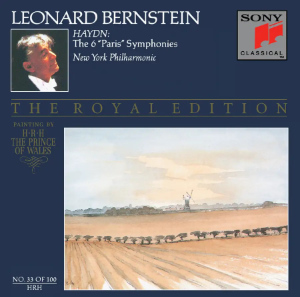
Franz Joseph Haydn (1732-1809)
“Paris” Symphonies Hob. I: 82-87
New York Philharmonic/Leonard Bernstein
rec. 1962, Manhattan Center, New York, (82, 83); 1966/67, Philharmonic Hall, Lincoln Center, New York
Presto CD
Sony Classical SM2K47550 [2 CDs: 145]
Leonard Bernstein’s classic recordings of Haydn’s “Paris” Symphonies, with the New York Philharmonic, are available again on CD, thanks to Presto Classical. These iconic accounts should never have disappeared from the catalogue, even if they were accessible through streaming or on used discs.
As was typical in the 1960s, this is big-band Haydn. It contrasts with current performance practice on period instruments and with smaller forces. It is known that Haydn had a preference for larger ensembles, so the New York Philharmonic should satisfy even the most discriminate listeners. What is important is to hear the various parts of Haydn’s orchestration with the required transparency. Bernstein provides this in spades, and does not shortchange the composer’s humour. In almost all cases, I was delighted with the results of these performances. The beefy sound has also held up well, even if it cannot quite compete with more recent recordings.
Symphony No.82 “The Bear” gets a terrific account. It is robust for sure, but there is also attention to the more lyrical parts. The finale with its droning basses in fifths – which reminded some of dancing bears – is especially joyous, filled with Haydnesque humour. Likewise, Bernstein does total justice to No.83 “The Hen”, the only “Paris” symphony in a minor key. It begins with a bang and, marked Allegro spiritoso,receives a high-spirited performance. One can easily visualize the clucking hens in the first movement’s second subject, beginning with the strings and followed by the oboes. There follows the more lyrical, Mozartian No.84, where Bernstein brings out the songfulness very well, and delights in the joy of the Vivace finale without unduly rushing it.
In Symphony No.85 “The Queen”, Bernstein follows an energetic, emphatic first movement with a true Allegretto in the Romance’s set of variations on a French folksong. The ensuing Menuet is quite deliberate and stately, but infectious with notable harmony in the horns. No.86’s second movement is a Capriccio, marked Largo, and Bernstein takes it very slowly, arguably too slowly. His lasts 8:33, while Colin Davis takes 7:03 on Decca, and Simon Rattle 6:08 on Warner. Likewise, in the following Menuet, Bernstein’s 6:20 versus Davis’s 5:21 and Rattle’s 5:15 is telling; Bernstein’s reading is sturdy and heavy-footed. No.86’s Finale marked Allegro con spirito is about as spirited as it gets, 5:52 versus Davis at 6:13 and Rattle 6:33. You pays your money and takes your choice! I felt the same way about Symphony No. 87. While Bernstein perfectly captures the exuberance of the first and last movements, both marked Vivace, I found him to be too deliberate in the middle movements, particularly the rather heavy and forceful Menuet.
Overall, though, these accounts have stood up well, and they belong in any respectable Haydn collection. The Presto reissue is from the Royal Edition, with paintings by King Charles, then Prince of Wales, on the booklet cover, and with barely adequate notes in four languages on the symphonies.
Leslie Wright
Buying this recording via a link below generates revenue for MWI, which helps the site remain free



















